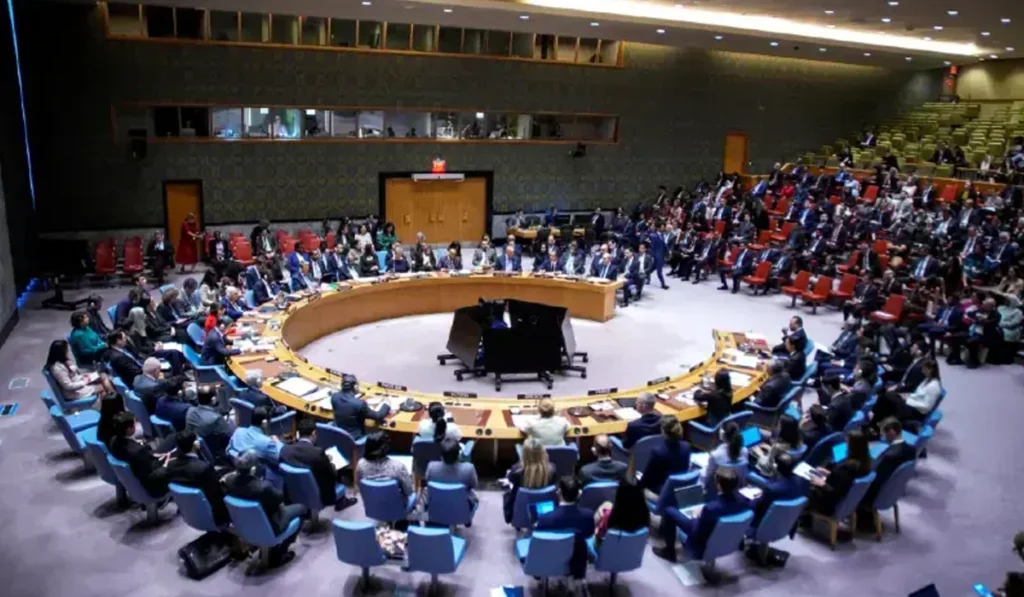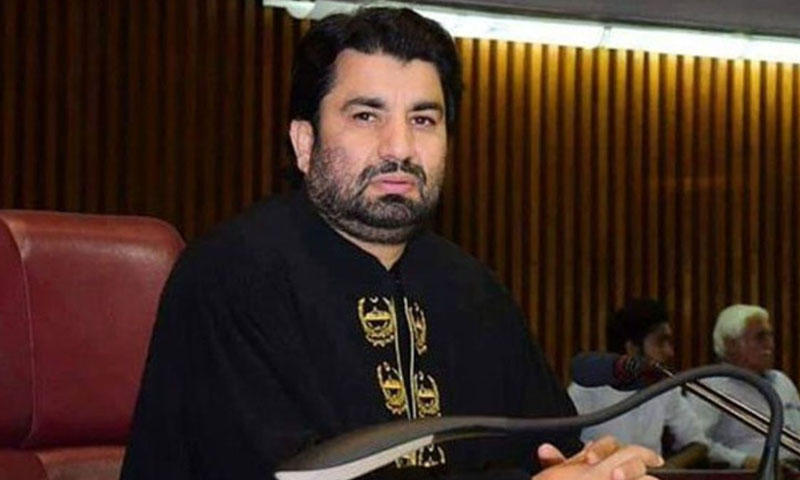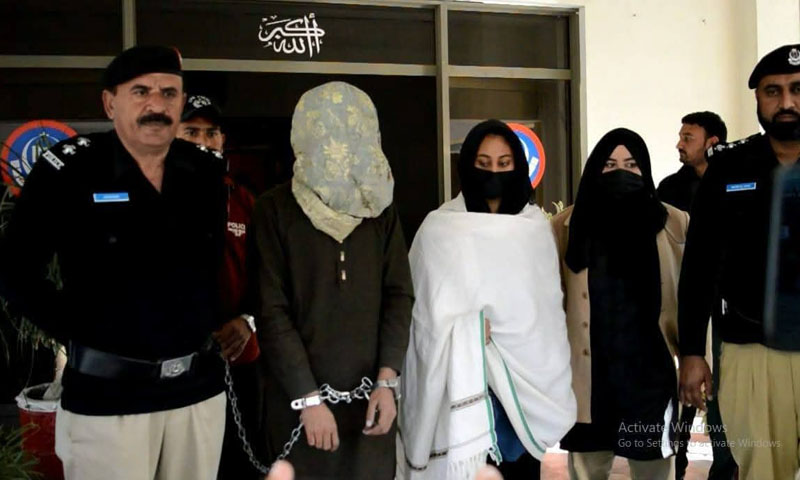- Web Desk
- Feb 09, 2026
Strike on Doha: Pakistan urges UNSC to hold Israel accountable
-

- Web Desk
- Sep 12, 2025

UNITED NATIONS: Pakistan and Israel traded barbs at the United Nations Security Council on Thursday after Pakistan denounced Israel’s recent strike on Doha targetting Hamas leaders, calling it “illegal, unprovoked and a threat to regional stability.”
The verbal clash occurred during an emergency session on the Middle East, convened at the request of Algeria, Pakistan and Somalia, and supported by France and the United Kingdom.
Pakistan’s Permanent Representative to the UN Asim Iftikhar Ahmad, opened his remarks with a strong condemnation of the Israeli strike, calling it a violation of Qatar’s sovereignty and an “audacious and unlawful act.”
“This illegal and brazen attack is not an isolated incident but part of Israel’s broader and persistent pattern of aggression and breaches of international law that undermine regional peace and stability,” he said.
He noted that Israel had struck a residential compound, deliberately endangering civilian lives, which he described as a “serious violation of international humanitarian law.”
Ahmad warned that the strike posed a direct challenge to diplomacy, as it was carried out when sensitive Gaza-related negotiations were showing signs of progress.
“Targeting the territory of a key mediator and individuals directly engaged in talks is a deliberate attempt to sabotage diplomacy, derail peace efforts and aggravate civilian suffering,” he added.
Citing Prime Minister Shehbaz Sharif and Foreign Minister Ishaq Dar’s recent visit to Doha, he reaffirmed Pakistan’s solidarity with Qatar, describing the trip as a reflection of Pakistan’s unwavering support for Qatar’s sovereignty and its commitment to peace in the Middle East.
Qatar says mulling over response to Doha attack, Israel threatens more
Ahmad further said the strike violated the UN Charter, particularly Article 2(4), which prohibits the use of force against the territorial integrity or political independence of any state. He warned that the attack was consistent with Israel’s long record of cross-border operations in Gaza, Syria, Lebanon, Iran and Yemen, calling it “another example of Israel’s systematic breaches of international law and open policy of destabilizing the region.”
He recalled that the UN Security Council itself had earlier issued a unanimous statement condemning the strike on Doha, expressing regret over the loss of life, reaffirming Qatar’s sovereignty and territorial integrity, and recognizing its key role alongside Egypt and the United States in Gaza ceasefire talks.
In response, Israel’s envoy invoked the example of Osama bin Laden’s killing in Pakistan to justify the Doha strike.
“When bin Laden was eliminated in Pakistan, the question was not why a terrorist was targeted on foreign soil, but why he was being sheltered. The same question arises today. There was no immunity for bin Laden, nor is there for Hamas,” he said.
Pakistan immediately exercised its right of reply, with Ambassador Ahmad dismissing the comparison as “unacceptable and absurd,” accusing Israel of trying to deflect attention from its “illegal actions and violations of international law.”
“Israel is a serial violator of the UN Charter and international law, an occupying power that intimidates the global community, human rights groups and even the UN itself — all with impunity. Despite being the aggressor, it projects itself as the victim, but today it stands fully exposed,” Ahmad declared.
He also highlighted Pakistan’s role in fighting terrorism, saying: “The international community is fully aware of the immense sacrifices Pakistan has made in the fight against terrorism. Al-Qaeda was largely dismantled because of Pakistan’s counter-terrorism efforts, and we remain committed to this collective struggle.”
Israel’s envoy, however, accused Pakistan and others of “double standards.” He said, “Perhaps my remarks have caused discomfort, and I apologize for that, but I always speak facts. The fact is that bin Laden was killed in Pakistan, and no one criticized the US for it. When other countries target terrorists, they are not condemned. You cannot change the fact that 9/11 happened, nor that bin Laden was in Pakistan. When you criticize us, ask yourself what standards you apply to your own country and what standards you apply to Israel.”
“We will not be intimidated by chants of destruction”
Qatar’s Prime Minister, Sheikh Mohammed bin Abdulrahman bin Jassim Al Thani, also addressed the session under UN procedures, condemning the Israeli strike in strong terms.
He said it had hit residential compounds housing negotiation teams, Hamas representatives and their families, leaving residents terrified.
“This is a violation of the sovereignty of a UN member state. Led by bloodthirsty extremists, Israel has crossed every line. Have you ever heard of a state targeting a mediator in this way?” he asked.
Linking Prime Minister Benjamin Netanyahu’s justification to the Taliban’s political office in Doha, he noted that the US had never attacked Taliban negotiators in Qatar. He warned that Israel’s actions were destabilizing the region and destroying prospects for peace. “We seek peace, not war, and we will not be intimidated by the chants of destruction,” he said.
UN Under-Secretary-General for Political and Peacebuilding Affairs Rosemary DiCarlo described the strike as a “worrying escalation” that endangered Qatar’s sovereignty and ongoing ceasefire and hostage negotiations. She confirmed that the strike had hit a residential area, killing several Hamas figures and a Qatari security official.
She stressed that the sovereignty and territorial integrity of any country playing a vital role in peace efforts — including Qatar — must be respected.
China’s envoy said the Israeli strike had disrupted diplomacy, especially since the US had proposed a ceasefire on September 7, which Israel accepted, only for Hamas negotiators to be targeted two days later.
“This is bad faith, irresponsible and a deliberate attempt to sabotage talks — it is deplorable,” he said.
Other major powers also voiced their positions. The US said unilateral strikes inside Qatar served neither Israeli nor American interests.
France called the attack a breach of international law. The United Kingdom said that it undermined peace and Israel’s long-term security.
Algeria and Somalia condemned Israel’s aggression and urged the Council to take steps to prevent further destabilization.
The debate highlighted deep divisions within the UN Security Council over the strike on Doha.
Pakistan played a leading role in condemning Israel and defending international law, with Ambassador Ahmad repeatedly stressing that lasting peace in the region was impossible without ending the occupation of Palestinian land and achieving a comprehensive political settlement.
Observers noted that Pakistan advanced not only moral condemnation but also legal and diplomatic arguments, stressing both the humanitarian consequences of the strike and its broader destabilizing effects.
Ahmad emphasised that targeting Qatar, a key mediator, was not just a violation of sovereignty but also a direct assault on diplomacy.
In closing, the UN Security Council reiterated the importance of mediation, hostage releases and a political resolution to the Gaza conflict. But the bitter exchanges between Pakistan and Israel, along with Qatar’s and China’s denunciations, underscored ongoing disagreements over accountability for state violence, interpretations of international law, and accusations of double standards.
The debate raised critical questions about whether global institutions can effectively curb unilateral military actions, ensure the protection of mediators, and safeguard civilians in conflict zones.
For Pakistan, the session was an opportunity to highlight its principled stance, support Qatar’s mediation role, and stress the need for accountability over actions that jeopardize regional peace and stability.
As the UN Security Council moves forward on the issue, the debate over Israel’s action in Doha could have far-reaching implications for Middle East diplomacy, the role of mediators, and the balance between counter-terrorism operations and international legal norms.




